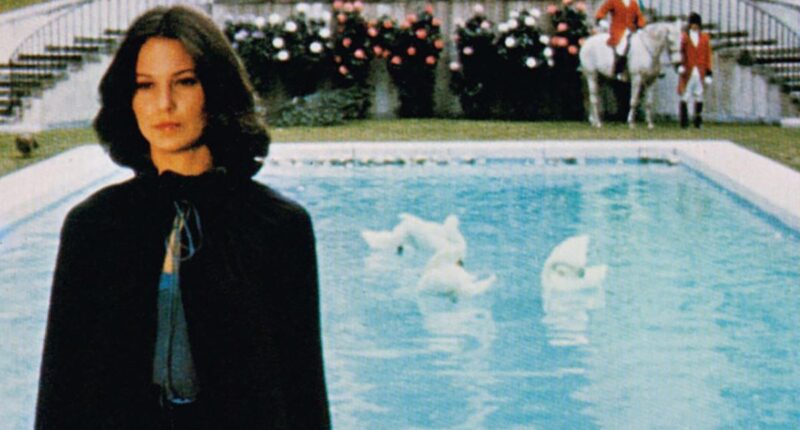Like a lot of young fans who are bitten by the horror bug, I spent my late teens playing catch-up, trying to cram in as many of the “essential” classics as possible while also trying (and failing, because I could only buy so many movie tickets) to keep up with new releases. Fortunately for me, and for a lot of other Millennials, Bravo’s 100 Scariest Movie Moments arrived in the fall of 2004 to help out with that quest.
For those who haven’t seen this five-hour behemoth, it’s a collection of scary moments as discussed by various horror celebrities, and while it largely covers the expected territory – Jaws, The Exorcist, Alien, what have you – there are a few films tucked in there that I hadn’t even heard of as a teenager. Some of these films were just classics I’d not yet discovered, while others have since gotten their due in various critical reappraisals. But one film in the bunch still stands out to me as a kind of horror hidden gem, a forgotten artifact of a subgenre boom that deserves more eyes on it, and fortunately for everyone, it’s sitting right there on Netflix.
The film is The Sentinel, released in 1977 and based on the novel of the same name by Jeffrey Konvitz. Directed by Death Wish helmer Michael Winner and featuring an all-star cast with some bona fide Hollywood legends thrown in, it’s a film that arrived at the tail end of the ’70s Satanic prestige horror boom, did OK at the box office, and then just sort of faded.
But there’s a reason The Sentinel keeps coming back, and it’s not just the one jumpscare highlighted in the Bravo special 20 years ago. For all its scattered plotting and rushed emotional arcs, it’s a film with a lot to offer, and it builds to the kind of horrific crescendo that fans of the genre love.
First, the basics: Alison Parker (Cristina Raines, better known for films like Nashville and The Duellists) is a successful model who’s looking for some independence after years of living under the care of her high-powered attorney boyfriend Michael (Chris Sarandon). She has a history of mental health issues, you see, including a couple of suicide attempts, and Michael doesn’t think she should be on her own when their relationship is so serious. But Alison craves solitude, and finds it thanks to an elegant rental agent (the one and only Ava Gardner) who shows her a furnished apartment in a historic brownstone in Brooklyn. As Alison settles in, she’s bothered by strange neighbors (played by Burgess Meredith, Sylvia Miles, and others), the general sinister vibe of the place, and the blind priest (John Carradine) who lives on the top floor and seems to never leave his perch in the front window. She’s also bothered by a sudden onset of fainting spells, hallucinations, and flashbacks to her own dark past.
Right away, the film and its beautiful little apartment building offer Rosemary’s Baby vibes, particularly as Michael starts to question whether Alison is really experiencing these strange things or just hallucinating them. Things get weirder when Alison starts to question if she ever actually had any neighbors, or if it’s just been her and the blind priest in this big old building together.
As a prologue scene lays bare, whatever’s happening here has Demonic implications. The Catholic Church owns the building, you see, and the priest is there for a purpose that Alison feels determined to decipher. These elements make it easy to understand why The Sentinel was attractive to Hollywood in the years after Rosemary’s Baby, The Exorcist, and The Omen all proved to be hits at the box office. People loved taking in stories about The Devil in the 1970s just as much or more than they do now, and Konvitz’s novel was prime material. Throw in some very atmospheric direction from Winner, who plays up the spooky corners of the house and really dials into Alison’s encroaching madness, and it seems like a recipe for a lasting hit.
So, why wasn’t it? Well, for all its big ideas, and there are a lot of them, The Sentinel can never quite decide what kind of movie it wants to be. At times it’s a paranoid psychodrama, at times an occult horror picture, at times a sort of weird gritty police procedural plopped down in the middle of a haunted house narrative, and at times a psychological thriller rich in subtext and meaning. But all of these things are crowded together, jockeying for attention in a film that runs just 90-or-so minutes, so none of them ever really get to take the lead. It’s kind of a well-intentioned mess, and that mess gets even more pronounced when you factor in the way the film treats suicidal ideation (trigger warning for those of you who affected by such things).
With all that in mind, why are we here? Why am I taking the time to direct you to a film from the ’70s that’s an admitted mess and doesn’t fulfill its potential? Because, for all its faults, The Sentinel is legitimately frightening. Winner, no stranger to grit and terror thanks to his Death Wish experience, steeps the film in dread, and in moments of shocking and vivid grotesquery ranging from Alison’s philandering father to the strange behavior of Alison’s neighbors as they convene to throw a birthday party for a cat. There is something deeply wrong here from the moment Alison sets foot in that building, and Winner’s ability to just keep pushing that feeling on his audience, despite sometimes lackluster performances, makes this a film that will have you squirming on the coach, waiting for the true horror to show itself.
And when it does show itself, The Sentinel goes places that the other Satanic horror pictures that burst out of the ’70s simply don’t. I won’t spoil the solution to the mystery here, but as the building’s intense darkness grows, figures begin to come almost literally out of the woodwork, grotesque demonic nightmares with ashen skin and milky eyes that emerge slowly at first, then merge into a veritable army. The film’s climax is among the more unsettling things you’ll find in 1970s horror, both visually and existentially, a moment so potent that you’re able to overlook its flaws and relish the dirty, wicked, ’70s horror grit of it all.
So, if you think you’ve already seen all the big horror films from the 1970s, and you’re looking for the next level, go find The Sentinel. It’s worth it.
Matthew Jackson (@awalrusdarkly) is a pop culture writer and nerd-for-hire whose work has appeared at Syfy Wire, Mental Floss, Looper, Playboy, and Uproxx, among others. He lives in Austin, Texas, and he’s always counting the days until Christmas.
(function(d, s, id) {
var js, fjs = d.getElementsByTagName(s)[0];
if (d.getElementById(id)) return;
js = d.createElement(s); js.id = id;
js.src = “//connect.facebook.net/en_US/sdk.js#xfbml=1&appId=823934954307605&version=v2.8”;
fjs.parentNode.insertBefore(js, fjs);
}(document, ‘script’, ‘facebook-jssdk’));

















